
Audio Version (Press Play & Scroll Seamlessly Through the Article ▶️🎶)
Tarot cards are beautiful, mysterious, and often thought to have the power to glimpse into our future. But, a controversial question emerges from the depths of this arcane practice – can tarot cards ruin your life?
We're not aiming to scare you or stir up unnecessary drama. But it's a question that floats around, especially for those new to the world of tarot or those who've heard unnerving tales from friends or relatives.
Can a tarot card really wield that much power? Can an innocent-looking deck somehow, someway, turn your life upside down? Can tarot cards ruin your life? Let's find out.
Table of Contents
- What Tarot Is (and Isn’t)
- Can Tarot Cards Ruin Your Life?
- Tarot Card Misinterpretations
- Tarot Card Misconceptions
- Predicting the Future
- Repeatedly Asking The Same Question
- Having Card Favorites
- Getting Obsessed
- The Gambler’s Mentality
- Why Personal Accountability Matters with Tarot
- Using Tarot Cards Responsibly
- Last Words
What Tarot Is (and Isn’t)
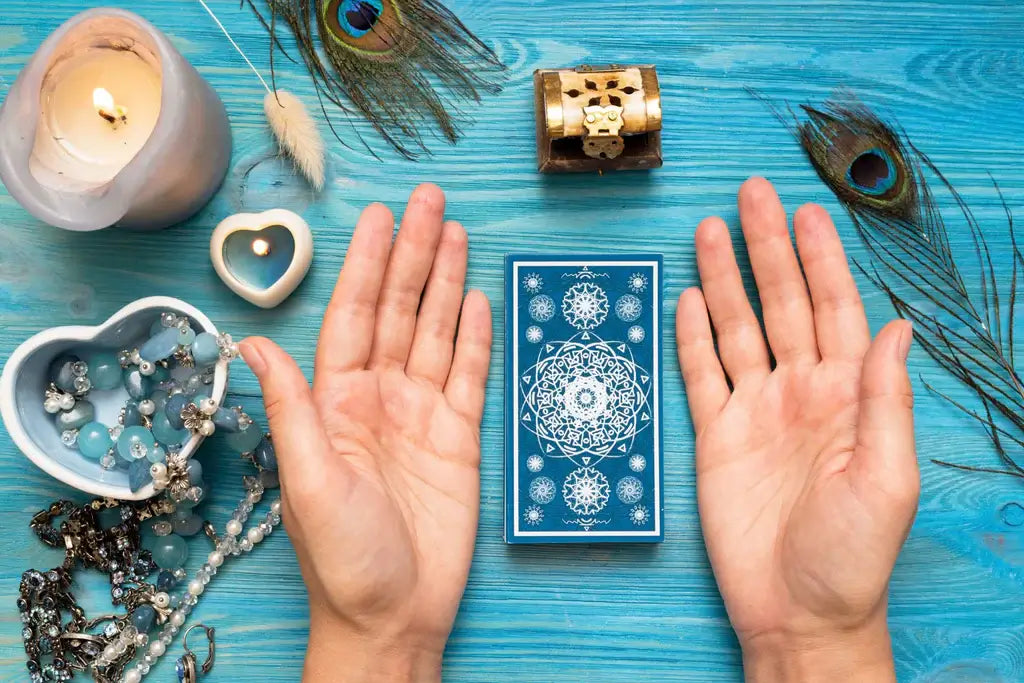
Before we delve into if tarot cards can ruin your life, let's dig into the essence of tarot – defining what it is and, just as importantly, what it isn't. This understanding is critical in debunking myths and setting clear expectations for your tarot journey.
What Tarot Is
It's a mirror that reflects your inner world, your subconscious thoughts, feelings, and potential paths lying before you.
Tarot helps you uncover patterns, spot opportunities, and even come face-to-face with challenges you may need to address.
The cards act as visual storytelling aids, each carrying rich symbolism and narrative that speak to common human experiences and situations. From the Major Arcana, with its archetypical figures and life's big themes, to the Minor Arcana, which deals with the day-to-day aspects of life, tarot captures a broad spectrum of human existence.
A tarot reading is like a conversation with your inner self. It offers a moment of pause, a space for reflection, and a way to tap into your intuition and inner wisdom. It promotes personal growth, self-awareness, and conscious decision-making.
What Tarot Isn't
First and foremost, tarot is not a tool for predicting a fixed or unchangeable future. Tarot cards offer possibilities based on your current state, but the future, shaped by your decisions and actions, remains in your hands.
Tarot isn't a tool for making decisions on your behalf. It can provide insights and perspectives, but the responsibility of decision-making always rests with you.
Using tarot as an excuse to avoid tough decisions or to abdicate personal responsibility is a misuse of this tool.
Think of tarot as a wise old friend who holds up a mirror to your life, revealing aspects that you may have been unaware of or perhaps chose to ignore. Tarot readings stir up your intuition, nudging you to listen to that quiet inner voice that often gets drowned in the hustle and bustle of life. They offer guidance, lighting up different paths and possibilities you may have missed.
But they don't make the decisions for you – that power stays firmly in your hands.
Can Tarot Cards Ruin Your Life?
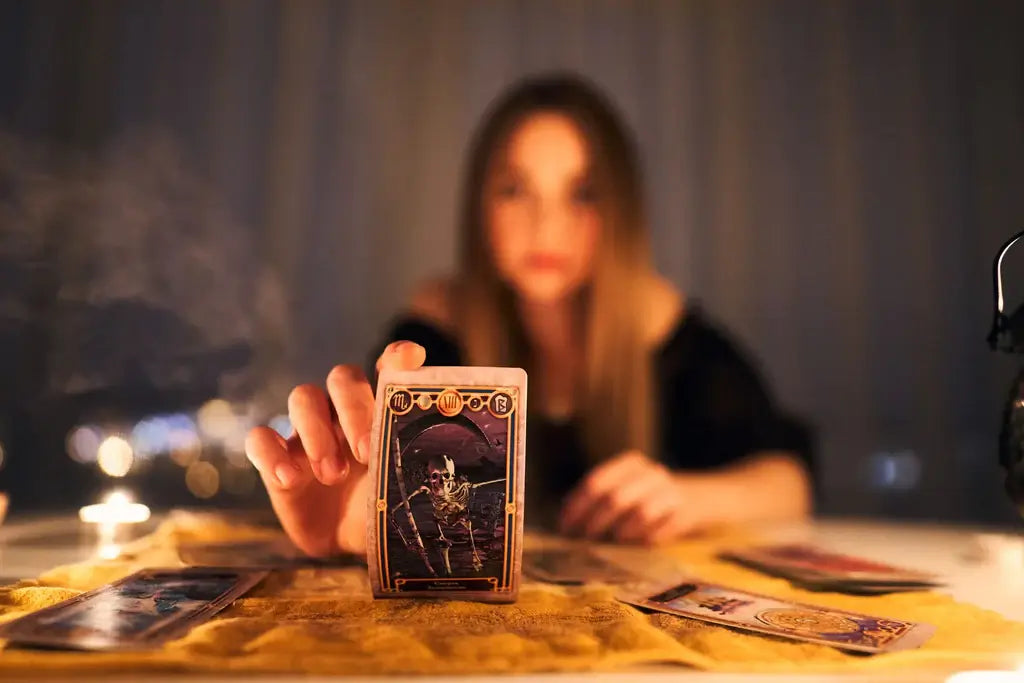
The short answer: No, they can't. But let's dig deeper.
Believing that tarot cards have the power to ruin your life is a classic case of misunderstanding, like blaming the mirror for the reflection it shows. Tarot cards are merely a tool, a mirror of sorts, reflecting your subconscious thoughts and emotions. They don't create your reality; they reflect your current reality.
It's like blaming a weather forecast for a rainy day. The forecast didn't cause the rain; it just told you what was likely to happen based on the current conditions.
Tarot cards are not puppet masters pulling your life's strings. They're guides and counselors, offering insights and perspectives that you might have missed. They help you see patterns, possibilities, and choices.
They can't make decisions for you. They can't take action. They can't dictate your reactions. That's all on you.
You are the one who decides what to do with the insights tarot provides. They are tools for introspection and decision-making, not definitive life outcomes.
Remember, perspective is a powerful thing.
If you view tarot cards as omens of doom, then they can seem like life-ruiners. But if you see them as they truly are – tools for self-awareness, introspection, and guidance – then they become empowering and enlightening.
And it all starts by making sure you interpret the cards correctly.
Tarot Card Misinterpretations
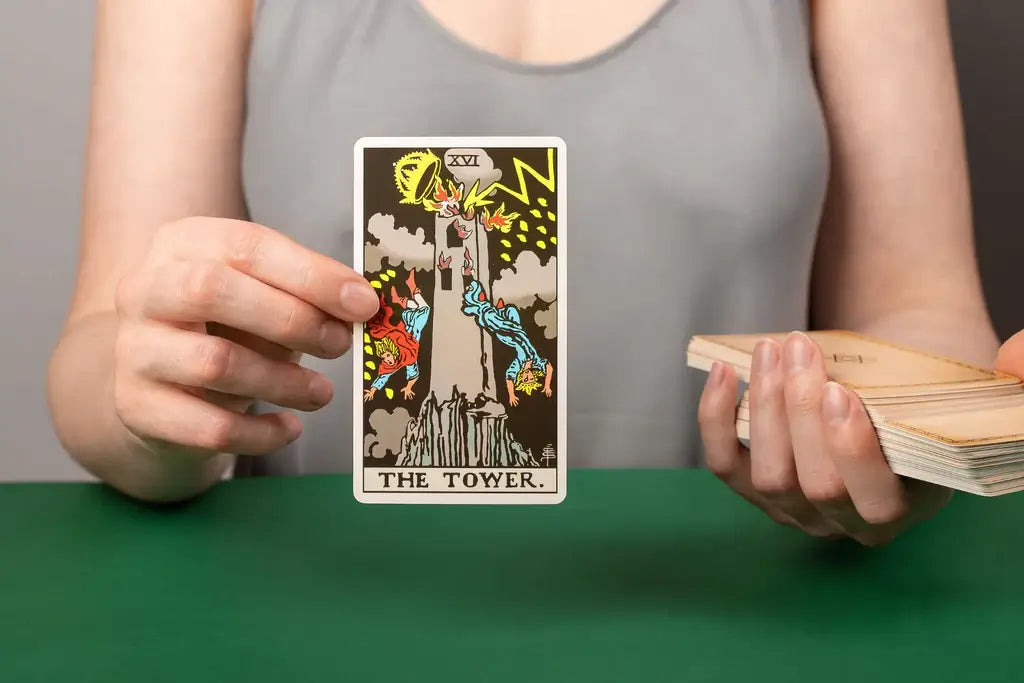
Misinterpreting tarot cards is like hearing gossip about a friend and believing it without hearing their side of the story. Misinterpretations can breed fear, anxiety, and yes, it might even lead one to think that tarot cards could ruin their life.
Take, for instance, 'The Death' card. The image of the grim reaper is enough to make anyone's heart skip a beat. But here's the real scoop: 'Death' in tarot-speak isn't literal. It's not predicting an impending doom or calamity. Instead, this card symbolizes endings and beginnings, transformation, or a period of transition, signaling a time of change or rebirth.
Similarly, 'The Tower' card is often greeted with gasps. It typically shows a tower struck by lightning, with people falling out of it – a vision of disaster, right? But hold on a minute. This card represents unexpected change or a revelation that may shake your current perceptions. It's not about destruction but about rebuilding and finding a stronger foundation.
Misinterpretation can create unnecessary fear or concern, and you'd be filled with dread every time you pick up a tarot deck.
But when you understand the actual meanings behind these cards, they transform from ominous threats to messages of guidance and growth.
So, before you let a tarot reading make your blood run cold, remember this: every card in the tarot deck has a range of meanings, and they're not there to scare you. They're there to guide you, to help you reflect, and to offer new perspectives.
Tarot Card Misconceptions
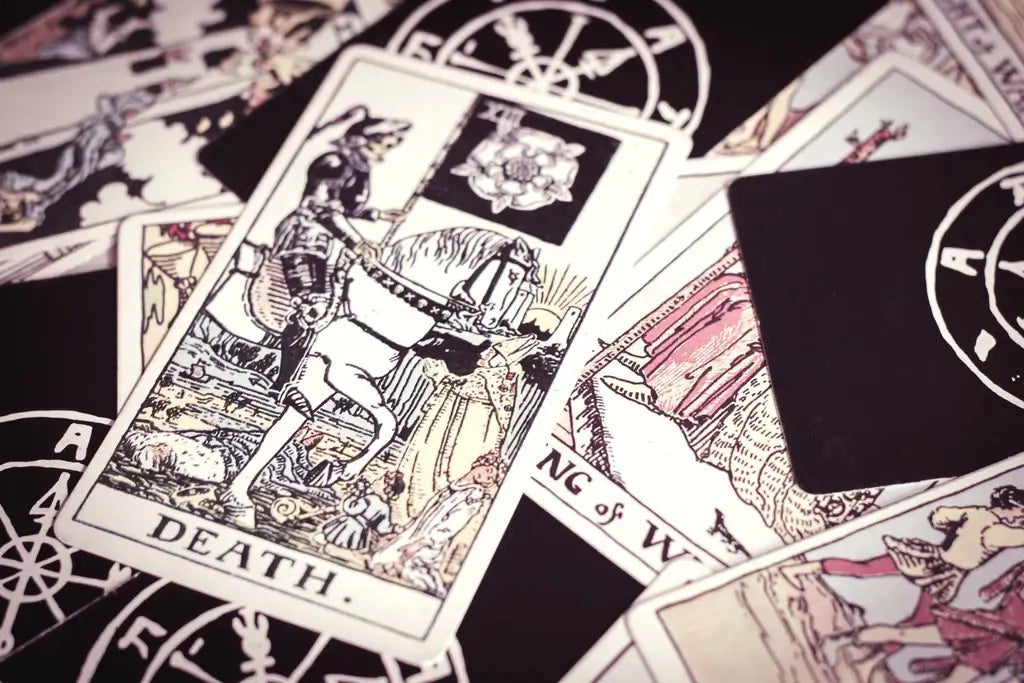
Now, here come the misconceptions – and there are plenty.
Some people view tarot cards with a sense of fear or apprehension, thinking that they predict an unchangeable future. But tarot cards can’t tell you what will happen no matter what. Instead, they offer insights based on your current path and state of mind.
Another common myth is that tarot cards are 'evil' or 'dangerous.' In reality, they're simply cards with pictures and symbols, and it’s the interpretation that adds meaning.
Predicting the Future
The most common misconception is asking tarot cards to predict the future. It's natural to want a sneak peek into what's coming next. However, tarot cards aren't fortune tellers or crystal balls.
They're more like mirrors, reflecting your current state and offering guidance based on it.
Asking tarot cards to predict your future is like asking a mirror to show you tomorrow's reflection. It doesn't work that way.
Tarot cards provide insight into the present moment, helping you understand the here and now. And understanding the present is the key to shaping a future that aligns with your desires and goals.
To understand this better, let's briefly cover the two main parts of a tarot deck - the Major and Minor Arcana.
Imagine going to a movie. The Major Arcana are the big dramatic events - the plot twists, the climactic moments, the epic lessons our heroes learn. They reflect major life events or powerful spiritual and emotional themes.
On the other hand, the Minor Arcana are like the smaller, everyday scenes that make up the rest of the movie. They deal with day-to-day issues, relationships, feelings, thoughts – the stuff that fills our life between the big 'movie moments.'
Together, they create a complete picture of our life's journey, but they don't predict a fixed future. If they did, then we would all be stuck on a predetermined path, like a train on its tracks.
But life isn't like that. We all have free will, choices, and the ability to change. Tarot cards reflect the here and now, and based on that, they can suggest possible outcomes.
But the power to choose and to change the future always remains with you.
Repeatedly Asking The Same Question
We've all been there. A situation is bothering us, and we desperately want clarity. We turn to tarot cards and ask the same question over and over, hoping for a different answer.
Repeatedly asking the same question is a bit like poking a bruise to see if it still hurts. It doesn't aid in healing; it just creates more discomfort.
Instead, try asking different questions that approach the issue from various angles. This can provide a more rounded understanding and insightful guidance, helping you to move forward instead of staying stuck in a loop.
Having Card Favorites
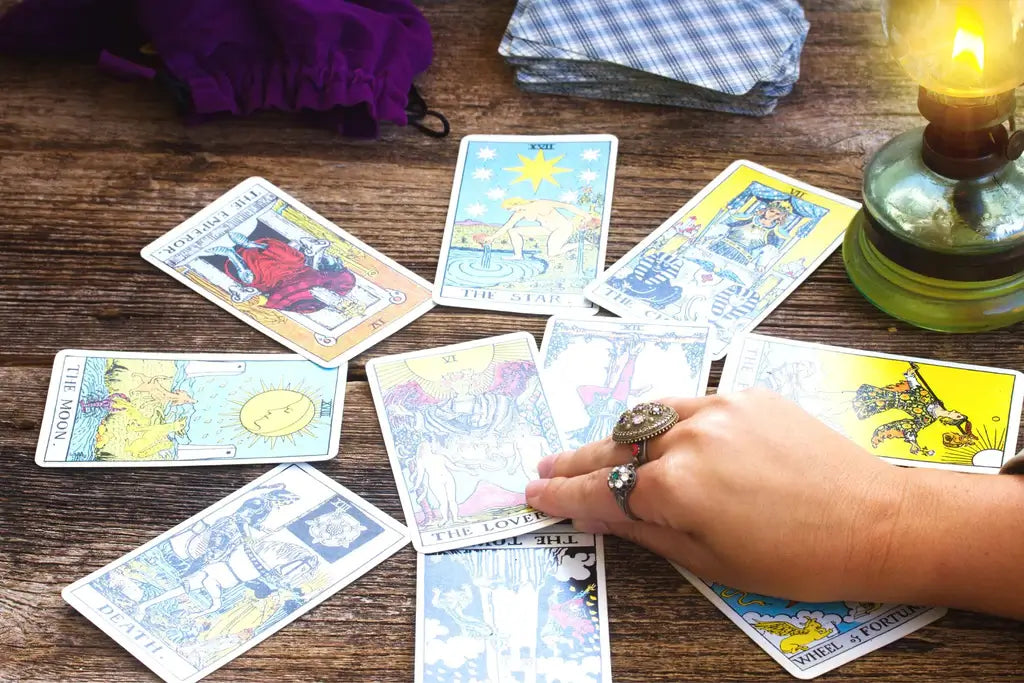
It's human nature to have favorites. But when it comes to tarot cards, favoritism can lead to misinterpretation.
If you find yourself always excited to see 'The Lovers' card because you associate it with romance and ignore its other meanings, such as harmony, partnership, or choice, you're missing a big part of the picture.
Similarly, dreading the 'Hanged Man' card because you associate it with punishment or suffering overlooks its messages of letting go, seeing things from a new perspective, and personal transformation. Every card in the deck has a range of meanings. Favoring one interpretation over others can lead to incomplete or skewed insights.
Getting Obsessed
It's easy to become so fascinated by tarot cards that you start consulting them for every single decision, big or small.
Tarot cards are a tool for introspection, not a crutch for decision-making.
Relying on them obsessively can lead you to abdicate personal responsibility and creates an unhealthy dependency. It's like using the GPS even when you know the way home.
Use tarot as a guide to illuminate your path, not as a substitute for your personal judgment and free will.
The Gambler’s Mentality
Have you ever found yourself drawing card after card, hoping the next one will finally reveal the 'perfect' answer?
This is a clear sign of falling into the gambler's mentality trap – the misguided belief that the next draw will bring the jackpot, the ultimate clarity, or the solution to all problems. This approach treats tarot more like a game of chance rather than a tool for introspection and self-guidance.
But here's the thing: tarot doesn't work on luck or chance. It's not about hitting the jackpot or getting a 'winning' card. And like a casino game, the house always wins with the gambler's mentality - in this case, it can lead to confusion, stress, and an unhealthy obsession.
What's more, obsessively drawing cards in the hope of a 'better' reading can create a sense of dependency and foster avoidance of real-life action or decision-making. Instead of empowering you, this approach disempowers you, leaving you feeling at the mercy of the cards.
So, avoid the gambler's mentality when it comes to tarot. Approach your readings with a sense of openness and curiosity, seeking understanding and insight rather than the 'perfect' answer. This is the key to using tarot as a healthy, empowering tool on your personal journey.
Why Personal Accountability Matters with Tarot
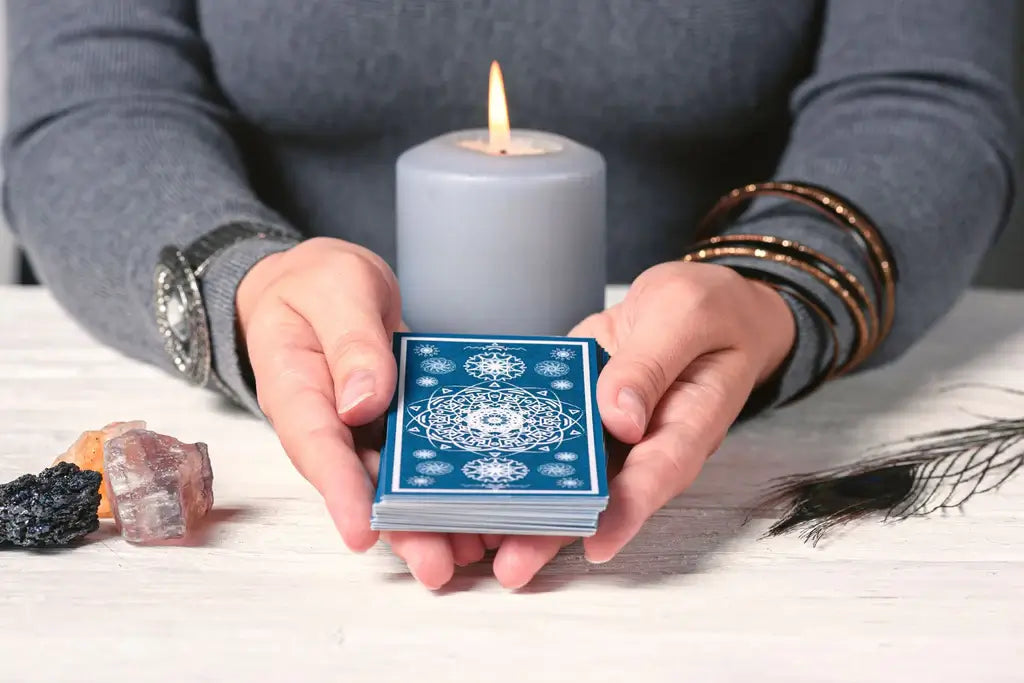
Imagine you're on a road trip navigating with a GPS device. It can show you different routes, point out potential obstacles, and even suggest stops along the way. But it can't drive the car, choose the speed, or decide when and where to stop. That's up to the driver – in this case, you.
Similarly, tarot cards can lay out different paths, highlight possible challenges, and suggest potential opportunities. But how you interpret the readings, make decisions, and take action depends on you. That's personal accountability.
Now, what happens if you attribute too much power to tarot cards, or any divination tool for that matter?
It's like handing over the steering wheel of your life to someone else. You risk abdicating your personal responsibility, becoming a passenger in your own life, and blaming tarot cards for the bumps and detours on your life's journey. And that's not a healthy or empowering place to be.
Remember, tarot cards can be insightful guides, but you are the master of your journey. Recognizing this is a critical step in using tarot responsibly and effectively and in dismissing the notion that tarot cards can ruin your life.
Using Tarot Cards Responsibly

Don't use tarot cards as an excuse to avoid responsibility or to sidestep making tough decisions.
This section below is your 'tarot driving lesson' – read on to learn how to steer these mystical tools safely and responsibly.
Don’t Let Emotions Guide a Reading
Reading tarot cards while you're in a state of fear or distress can skew your interpretation of the cards. When you're in such a state, you might project your fears onto the cards, interpreting their messages in the worst possible light. For example, your immediate response to the 'Five of Cups' might be to think of loss, regret, or disappointment - emotions that may align with your current distress.
However, when looked at from a calm and open perspective, this card also carries a powerful message of healing and moving forward. It urges us to turn away from our past disappointments and focus on the opportunities we still have.
If you were reading in a state of fear or distress, you might miss this hopeful aspect of the 'Five of Cups.' This is why it's so essential to approach your tarot readings from a calm, grounded place.
Take a few deep breaths as you cleanse your tarot cards, do a quick meditation, or sip a soothing cup of tea. The aim is to be present, calm, and open-minded. This helps you approach the reading from a balanced place rather than being overly influenced by strong emotions or preconceived notions.
Read Cautiously For Others
Reading tarot for others can be a rewarding experience, but it also comes with its risks. One of the key risks is overstepping personal boundaries or giving advice outside of your expertise, especially if you're exploring complex or emotionally charged issues.
While tarot cards are a fantastic tool for introspection and guidance, they're not a substitute for professional advice, whether that's medical, financial, legal, or psychological.
Also, be mindful of the energy and emotions involved. Reading for someone in a highly emotional or vulnerable state requires sensitivity and care. It's important to create a safe and respectful space for the reading, offering support and understanding rather than trying to 'fix' their problems.
Avoid Bias

This is a subtle yet significant pitfall in tarot readings. Your personal biases, beliefs, or preconceptions can unconsciously influence your interpretation of the cards. For example, when the 'Devil' card shows up in a reading, it can be quite intimidating due to its name and imagery. If you hold a bias based on these initial impressions, you might only associate this card with negativity or evil.
However, the 'Devil' card has many more layers to its meaning. It often signifies attachment, addiction, or being bound to material or superficial desires. It can also symbolize our shadows, fears, or repressed traits that need acknowledgment and understanding.
Yet, if you approach a tarot reading with a preconceived bias, you might only see the 'Devil' card as a bad omen, overlooking its valuable messages about self-awareness, breaking free from unhealthy patterns, or facing our inner shadows.
This is why it's important to remember that every card in the tarot deck holds a spectrum of interpretations, none of which are strictly 'good' or 'bad.' They are nuanced reflections of our life experiences, and our understanding of them can deepen when we set aside our biases and open ourselves to their full range of meanings.
To summarize, tarot reading should be done in a calm and grounded state, with an awareness of personal boundaries and an open, unbiased mind. This ensures the safe and responsible use of tarot cards, helping you to gain the most value and insight from your readings.
Last Words
So, can tarot cards ruin your life? We don’t think so.
Tarot cards are guides, tools for introspection and decision-making. They reflect your current state and show possible paths, but they do not – and cannot – determine your future or ruin your life. Only you have that power through your choices, actions, and decisions.
Attributing too much power to tarot cards, or misinterpreting their meaning, can lead to unnecessary worry or fear. And this is where personal accountability, a grounded approach, and responsible readings of tarot cards come into play.
As the driver of your life's journey, tarot cards are one of the many navigational tools at your disposal. Use them wisely, and you'll find they can illuminate your path in wonderful ways without any risk of 'ruining' your life.
Whenever you're ready, there are 4 ways I can help you:
1. Tridevia Tarot Deck: Join hundreds of cosmic explorers and spiritual enthusiasts in discovering the Tridevia Golden Foil 78-Card Tarot Deck, featuring enlightening affirmations in a luxurious collector’s box. Embark on a transformative journey of self-discovery and divine guidance.
2. Enlightening Tarot Courses: Join our vibrant community of spiritual seekers and take our Tridevia Tarot Deck courses. Tranform your life and elevate your readings with Tarot Meditations, Manifesting Daily, Creating Flow and Wealth, Unlocking Fertility and more.
3. FREE Mystical Tarot Guide: Yours for Free! This guide will help you master 78 cards in any deck and discover unique spreads for profound insights.🎁
4. Calmoura Tarot Academy: Follow our YouTube channel for eye-opening insightful videos and everyday tarot inspiration to help rewire your brain and change your life.